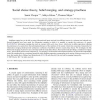326 search results - page 24 / 66 » Using Socially Deliberating Agents in Organized Settings |
ATAL
2003
Springer
14 years 1 months ago
2003
Springer
We analyse scenarios in which self-interested agents negotiate with each other in order to agree on deals to exchange resources. We consider two variants of the framework, one whe...
CEC
2009
IEEE
14 years 3 months ago
2009
IEEE
— Using a game-theoretic model combined with the evolutionary model, we investigate the conditions under which the desirable interaction rules will evolve and sustain in various ...
ATAL
2008
Springer
13 years 10 months ago
2008
Springer
When the same set of people interact frequently with one another, they grow to think more and more along the same lines, a phenomenon we call "collective cognitive convergenc...
INFFUS
2006
13 years 8 months ago
2006
Intelligent agents have to be able to merge informational inputs received from different sources in a coherent and rational way. Several proposals have been made for information m...
CORR
2011
Springer
13 years 3 months ago
2011
Springer
good solutions to complex problems. In many examples, individuals trying to solve superior global solution. This suggests that there may be general principles of information aggre...

